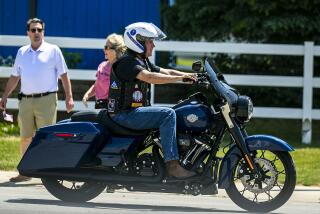GOP Rivals Take Aim at Forbes : Dole questions the economic impact of flat tax. Others attack the publishing heir over social views.
- Share via
DES MOINES — Dueling from distant corners of Iowa, front-running Republican presidential rivals Steve Forbes and Bob Dole traded barbs Monday over their electability and the likely economic impact of a flat tax--themes dominating the Iowa caucus campaign as it enters its final fractious week.
As the Iowa race showed further signs of tightening between the Senate leader from Kansas and the publishing heir from New Jersey, other candidates also tried to chip away at Forbes’ standing with Christian conservatives on social issues.
The combination, for the first time in recent weeks, appeared to put Forbes on the defensive. Angered by a Dole television campaign ad that claims Forbes’ flat-tax plan would raise the tax rate on many middle-income Americans, Forbes, campaigning by bus in western Iowa, challenged Dole to a “one-on-one debate.”
Then, responding to a growing flurry of critical mailings and attacks by several rival campaigns and fundamentalist activist groups over his social views, Forbes insisted he opposes same-sex marriages and defended his company’s private display of a seascape by controversial photographer Robert Mapplethorpe.
“I believe,” Forbes said during a Sioux City talk radio appearance, “in equal rights for all, special rights for none.”
Until now, Forbes has been able to largely set the campaign agenda, using his massive advantage in paid advertising.
According to a Forbes campaign filing Monday with the Federal Election Commission, during the last three months of 1995, Forbes spent more than $14 million, nearly $10 million of it on TV ads.
By comparison, Dole spent $8.4 million in that period, but less than $2 million appears to have gone to TV ads. Sen. Phil Gramm of Texas, former Tennessee Gov. Lamar Alexander and conservative commentator Patrick J. Buchanan all spent far less.
*
For his part, Dole tried to keep above the fray in several campaign stops in central Iowa. His campaign aides cheekily accepted Forbes’ call for a flat-tax debate, but only with Dole supporter and New Hampshire Gov. Steve Merrill as a stand-in. And Dole told voters in the university town of Ames that his experience makes him the only viable Republican to challenge President Clinton in the November general election.
“I think what it boils down to is experience, getting things done,” Dole said at a campaign stop at Iowa State University. “I like to get things done.”
Republican leaders here say that as many as 20% of the party’s likely voters in next Monday’s caucuses remain undecided. As undecided voters try to make up their mind, Dole is clearly hoping that experience and electability will become determining factors.
That could work. “What you have is a large group of undecideds, and even some of the support for the two top candidates is still pretty soft,” said Brian Kennedy, chairman of the state party.
After a year of listening to relentless campaigning on economic, cultural and social themes, a year in which they have been unable to sort out their opinions, undecided Republican voters are left with “deciding who can make the strongest candidate in November,” Kennedy said.
But the disenchantment with the field, both here and in New Hampshire--the other key early contest--could blunt that argument. In New Hampshire, a new poll taken by the Concord Monitor showed that fewer than 40% of that state’s likely Republican primary voters believe any of the GOP candidates can defeat Clinton.
*
But among undecided voters like Marilyn Mayberry, neither Dole’s veteran’s pose nor Forbes’ outsider’s appeal has yet to make a dent.
Mayberry, 43, a dairy worker and Christian conservative who showed up to see Forbes Monday night in Orange City, was no closer to a choice after listening to Forbes’ stump speech.
“I feel Dole’s too old,” Mayberry said. But she worries about Forbes, “scared that . . . he’ll come up short. I worry about his inexperience.”
Forbes, however, has had little time to reassure Iowa voters, for as he rises in the polls, he is increasingly forced to defend himself on issues other than his trademark flat-tax proposals.
In an appearance on a radio talk show and in speeches before western Iowa civic and political clubs, Forbes was forced to stray to myriad other subjects, from his criticism of a federal subsidy for ethanol, the grain-based gas substitute, to his angry rejection of Dole’s criticism that his family run magazine, Forbes, practiced age discrimination.
Most uncomfortably, Forbes had to defend himself against charges, some apparently stirred by whispering campaigns generated by opposing camps, on social issues.
At Forbes’ Orange City stop, Jason Carlton, a college student who supports Gramm, rose to ask if Forbes magazine displays a Mapplethorpe photograph. Forbes replied “the company has a yacht and one of the seascapes on it . . . the photograph was taken by Mapplethorpe 25 years ago. That’s the only one the company or the family owns.”
Carlton said he had “heard he owns these photos and that they’re homoerotic. That’s important to us.”
Times staff writers Nancy Hill-Holtzman and Richard A. Serrano contributed to this story.
(BEGIN TEXT OF INFOBOX / INFOGRAPHIC)
Louisiana Kicks Off Caucuses
The first presidential delegates of the 1996 election season will be selected today in Louisiana. The state’s Republican Party moved its caucuses to the head of the nominating process, much to the chagrin of traditional pacesetters Iowa and New Hampshire. But with many of the GOP candidates, including Bob Dole and Steve Forbes, boycotting the event and a voting population that is just 20% Republican, Louisiana has failed to usurp the influence of those other early contests. Turnout is expected to be very low, perhaps as few as 10,000 voters.
Caucus report
What to watch for: The Louisiana caucuses has emerged as key for two candidates.
Phil Gramm: The senator from Texas is counting on his neighboring Republicans to give him a big victory and a much-needed boost going into the more significant contests.
Patrick J. Buchanan: The commentator hopes to thwart Gramm, and propel his own campaign, with a strong Louisiana showing. He has spent much of the last week stumping in the state.
What’s at stake: 21 of 30 delegates to the GOP convention (the remaining nine will go to the winner of a primary March 12).
Who can vote: Voters who were registered as Republicans as of Jan. 7
Where and when can they vote: At 42 sites between 4-8 p.m. (CST)
The People
Population
Total: 4,330,077
White: 65%
Black: 31%
Latino: 2%
Other: 2%
*
Median family income
Louisiana: $32,992
U.S.: $34,761
*
Unemployment
Louisiana: 6.7%
U.S.: 5.6%
*
Violent crimes
Per 100,000 people
Louisiana: 982
U.S.: 716
The Politics
Registered voters
Total: 2,358,035
Republicans: 20%
Democrats: 68%
Others: 12%
*
Of Republican voters
93% are white
5% are black
2% are other
*
1992 presidential vote
Clinton: 46%
Bush: 41%
Perot: 12%
*
Elected officials
Governor: Mike Foster (R)
Senators: J. Bennett Johnston (D), John B. Breaux (D)
House delegation: 5 Republicans*, 2 Democrats
* 2 switched to the GOP since the ’94 congressional election
Sources: U.S. Census, Louisiana secretary of state, Claritas, Inc., various media sources
Researched by ROB CIOE and MALOY MOORE / Los Angeles Times
More to Read
Get the L.A. Times Politics newsletter
Deeply reported insights into legislation, politics and policy from Sacramento, Washington and beyond. In your inbox twice per week.
You may occasionally receive promotional content from the Los Angeles Times.









